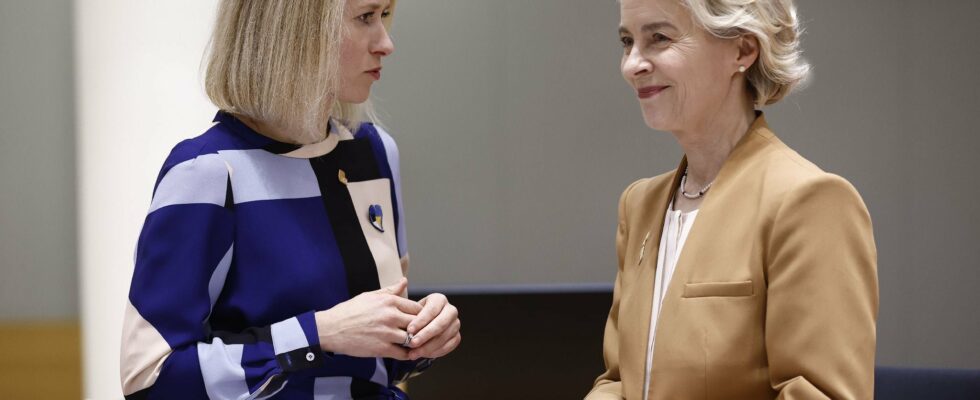In 2019, it took days of acrimonious negotiations to choose the holders of European “tob jobs”. Five years later, the match seems almost over less than a week after the European elections. Barring a last-minute drama, the 27 heads of state and government should reappoint the German Ursula von der Leyen as head of the Commission, appoint former Portuguese Prime Minister Antonio Costa as president of the European Council and charge the current head of the Estonian government Kaja Kallas to lead the bloc’s diplomacy. Europeans were able to discuss on the sidelines of the G7 in Italy, and will do so this weekend during the peace summit in Ukraine, in Switzerland.
According to certain sources, the appointments could even be announced as early as Monday June 17 after the leaders’ dinner in Brussels; at the latest, the decision will be taken officially at the European Summit on June 27 and 28. “This would be a faithful translation of the results of the vote at European level, analyzes Jean-Dominique Giuliani, the president of the Schuman Foundation. An intelligent consideration of balances, which notably includes a personality from eastern Europe.” With a conservative from a large founding country, a socialist from a small southern European country and a liberal from the East, all the boxes seem indeed ticked. The three largest pro-European political families would be served.
Macron is no longer able to impose his views
The election results cut short the suspense. “Scholz is weakened, Macron has his head elsewhere,” scathes a European source, pointing to the disastrous scores of the supporters of the German chancellor and the French president during the election. “The Mario Draghi hypothesis [NDLR : ancien patron de BCE et ex-chef du gouvernement italien] really appealed to the French president but it’s over,” says another.
The clear victory of the conservatives of the European People’s Party, who won 190 seats (14 more) and 26.39% of the votes, allows them to keep the most important position, that of the presidency of the Commission. “It’s the revenge of the German CDU-CSU on Emmanuel Macron” believes Jean-Dominique Giuliani. Five years ago, the French president was able to turn the table and refuse the candidacy of the German Manfred Weber. This time, he is no longer able to impose his views.
At 65, Ursula von der Leyen is therefore on the verge of serving again for five years, provided she properly negotiates the obstacle of the European Parliament. To lead the only institution of the European Union which has the power to propose legislation, it must receive an absolute majority of votes from MEPs in a secret ballot. In 2019, the former German Defense Minister narrowly passed, with a nine-vote lead.
What modus vivendi will she find with the socialist Antonio Costa, if he occupies the presidency of the European Council, despite legal proceedings for corruption still open in his country? “It is consensual,” reassures a diplomat. “In any case, it cannot be worse: with the Michelvon der Leyen duo, we have reached the bottom of the pool.” The disagreement between the Belgian Charles Michel and Ursula von der Leyen has tired European leaders, who hope for a peaceful relationship between the two future heads of Brussels. Many recall with nostalgia the somewhat dull figure of the Belgian Herman von Rompuy, the first holder of the office, who worked discreetly behind the scenes to develop compromises.
Kaja Kallas, experienced and skillful
A member of the liberal family, Kaja Kallas is therefore tipped to succeed the Spaniard Josep Borrell and inherit the complicated post of High Representative for Foreign Policy. The Estonian leader – 47 years old on June 18 – has become one of the most prominent European personalities thanks to her positions on the war in Ukraine. Experienced and skillful, it will nevertheless have a lot to do to exist in the face of national diplomacies jealous of their prerogatives. None of his predecessors succeeded in establishing themselves.
On the European Parliament side, the presidency should remain in the hands of the European People’s Party, via the re-election of Maltese Roberta Metsola. Once these important positions have been distributed, the European Commission will remain between now and the start of the school year in September.
France was well served in 2019 with a vast portfolio for Thierry Breton. What will happen this time? In Paris, the texts do not clearly establish who, the government or the President of the Republic, has the last word on the nomination of the candidate. “This could become one of the first subjects of confrontation between Emmanuel Macron and a Prime Minister of cohabitation,” sighs a French source.
.
